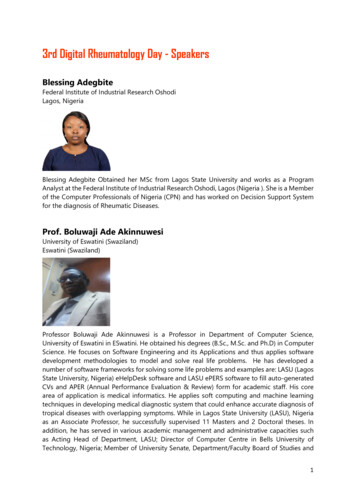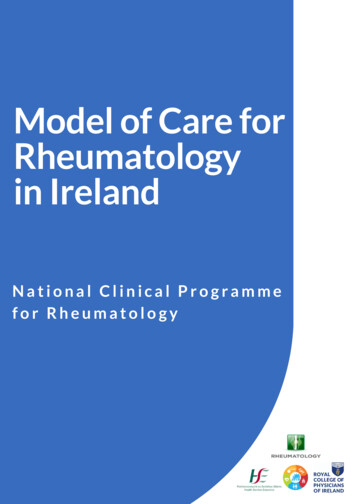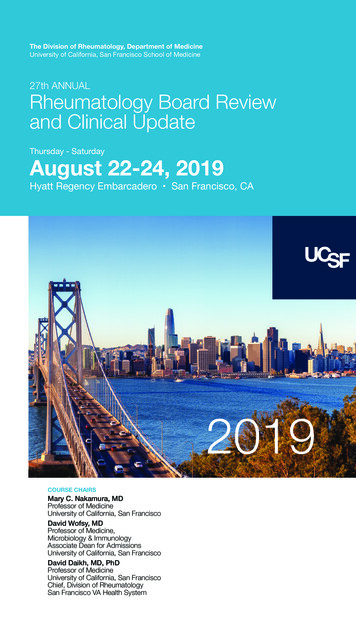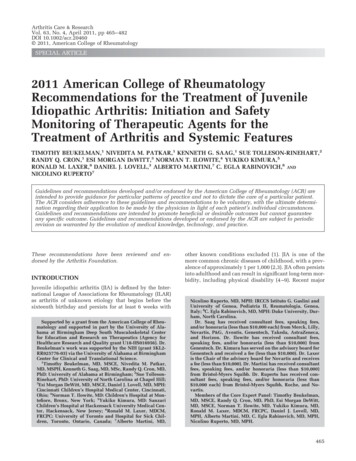
Transcription
3rd Digital Rheumatology Day - SpeakersBlessing AdegbiteFederal Institute of Industrial Research OshodiLagos, NigeriaBlessing Adegbite Obtained her MSc from Lagos State University and works as a ProgramAnalyst at the Federal Institute of Industrial Research Oshodi, Lagos (Nigeria ). She is a Memberof the Computer Professionals of Nigeria (CPN) and has worked on Decision Support Systemfor the diagnosis of Rheumatic Diseases.Prof. Boluwaji Ade AkinnuwesiUniversity of Eswatini (Swaziland)Eswatini (Swaziland)Professor Boluwaji Ade Akinnuwesi is a Professor in Department of Computer Science,University of Eswatini in ESwatini. He obtained his degrees (B.Sc., M.Sc. and Ph.D) in ComputerScience. He focuses on Software Engineering and its Applications and thus applies softwaredevelopment methodologies to model and solve real life problems. He has developed anumber of software frameworks for solving some life problems and examples are: LASU (LagosState University, Nigeria) eHelpDesk software and LASU ePERS software to fill auto-generatedCVs and APER (Annual Performance Evaluation & Review) form for academic staff. His corearea of application is medical informatics. He applies soft computing and machine learningtechniques in developing medical diagnostic system that could enhance accurate diagnosis oftropical diseases with overlapping symptoms. While in Lagos State University (LASU), Nigeriaas an Associate Professor, he successfully supervised 11 Masters and 2 Doctoral theses. Inaddition, he has served in various academic management and administrative capacities suchas Acting Head of Department, LASU; Director of Computer Centre in Bells University ofTechnology, Nigeria; Member of University Senate, Department/Faculty Board of Studies and1
several committees in the University. He has served in the capacity of external examiner tosome Universities and Colleges of Education. He also carry out review activities for a numberof journals and conferences. He has published a number of papers in journals and conferenceproceedings in his area of research. He is a full member of the following professional bodies:Computer Professional Registration Council of Nigeria, Nigeria Computer Society andAssociation of Computing Machinery. He was a research scholar in Southern University,Louisiana, USA. His areas of interest are: Software Engineering, Soft Computing, DatabaseSystems, Machine Learning, Medical Informatics, System Analysis and Design.Dr. Philipp BoschMedical University of GrazAustriaDr. Philipp Bosch is a rheumatology fellow and PhD candidate at the Medical University of Grazin Austria. His main research focus lies on the role of imaging in the diagnosis and treatmentof patients with SpA and GCA, with a second focus on new technologies in rheumatologypractice. He is currently working on a systematic literature review to inform a EULAR taskforceon the value of remote care in RMD patientsLeo CaratschUniverstiy Hospital LausanneSwitzerlandLeo Caratsch studied Medicine at University of Lausanne and obtained is federal MedicalDegree in October 2020. Since then, he has been working on his MD thesis in the field ofMachine Learning applied in Rheumatology. He’s currently working in a partnership withMatteo Caorsi from the company L2F to create a neural network model capable of recognizingradiographic features of hand osteoarthritis and rheumatoid arthritis.2
Dr. Matteo CaorsiL2FLausanne, SwitzerlandMatteo Caorsi is the CTO at L2F SA. L2F is the young company behind Giotto, a suite of artificialintelligence-based tools, with focus in the EUMDR compliance sector. He got his PhD inmathematics at SISSA (Italy) and he has worked in different research institutions in Europebefore joining L2F SA.Matthias DienerDigital Rheuma LabBerlin, GermanyMatthias is Co-Founder of the berlin-based startup Digital Rheuma Lab and founding memberof Patients for Digital Health (P4D), an initiative by patients for patients and all who see patientcentricityasan essential enabler for asustainable healthcare system.Against the background of being affected himself, Matthias engages in qualitative research onmarket environment and patient interest in rheumatology, combining his nceasapatient.His overall vision is to improve rheumatology care with the patient at the center of digitalsolutions3
Dr. Latika GuptaSanjay Gandhi Institute of Medical ScienceLakhnau, IndiaDr Gupta is a rheumatologist, clinical immunologist, and clinician scientist working as AssistantProfessor at SGPGI, a tertiary care teaching hospital in Lucknow, India. She currently serves asthe Social Media Editor for several Rheumatology journals and is the APLAR (Asia PacificLeague of Associations for Rheumatology) Young Rheumatology Webmaster. Recently, sheorganised the first focussed myositis meeting, the myoIN summit, a semi-virtual (hybrid) eventin Lucknow. She is a dedicated myositis researcher ( 100 publications) and recently foundedMyositis India, a patient support group for patients with this disease.Isabell HaaseUniversity Hospital DüsseldorfGermanyResident in rheumatology at the Heinrich Heine University in Düsseldorf with a researchfocus on pregnancy in rheumatic diseases. Deputy spokesperson and head of the homepageand social media subgroup of the Working Group of young German Rheumatologists.4
Julia HagenHealth Innovation HubBerlin, GermanyJulia Hagen was responsible for the Health & Pharma division at the digital association Bitkomuntil May 2019, where her main focus was on the regulatory framework for digital health. Shestudied Public Management & Governance at Zeppelin University in Friedrichshafen andSciences Po Paris. She came into contact with telemedicine and networked health throughquestions on rural health care and local public services of general interest. After working in thefield of European affairs for 2.5 years, she completed her Master of Public Administration (MPA)at Sciences Po Paris and the London School of Economics. At the health innovation hub, sheworks on various regulatory topics. Her main focus are digital health applications."Prof. Didier HansUniversity Hospital Lausanne (CHUV)Lausanne, SwitzerlandDidier Hans co-founded Med-Imaps SA in 2006 and became CEO of Medimaps Group in 2012.He currently drives the company’s global strategy, orientation and business objectives, andoversees its Quality Management framework and policies, among many other key tasks.Based in Switzerland, Didier Hans is also Head of Research and Development in the Bone andJoint Department at the Centre for Bone Diseases at Lausanne University Hospital. He heldsimilar positions in the United States – as Head of the Quantitative Ultrasound (QUS) ResearchUnit and Associate Scientific Director in the Osteoporosis and Arthritis Research Group (OARG)at the University of California San Francisco (UCSF) –; and in France as Head of the DXA/QUSResearch Unit at Lyon University Hospital.He has extensive experience (25 years) in dual-energy X-ray absorptiometry (DXA), bonemacro- and microarchitecture, ultrasound imaging techniques as well as body composition5
assessment. He teaches courses around the world on bone and body composition imaging aswell as on osteoporosis. He has authored 270 articles, received several awards including the2019 ISCD Researcher of the Year Award and serves on the editorial board of severalinternational scientific journals.He is a Member of the International Osteoporosis Foundation (IOF)’s Committee of ScientificAdvisors and Past President of the International Society for Clinical Densitometry (ISCD). Healso co-founded two companies: Synarc, Inc. (US) and Ascendys Sàrl (Switzerland), both ofwhich were successfully sold. He holds a PhD in Medical Physics and an Executive MBA fromHEC Geneva.Sandra Hauser-UllrichZAHW WinterthurSwitzerlandSandra Hauser-Ulrich is working at Zurich University of Applied Sciences ZHAW in theDepartment Psychology, research group Diagnostics and Counseling. She has a Master ofapplied Psychology, and currently is also a PhD student at University of Zurich UZH in the Careand Rehabilitation Science CRS Program at the Faculty of Medicine. In collaboration withpartners, she is developing and evaluating digital interventions for behavior change in clinicaland non-clinical settings. She is particularly interested in chatbot applications and investigateswhether and how they can be used effectively in people everyday life. She is involved in lecturesin the field of mHealth, health coaching and digitalization.6
Prof. Thomas HügleUniversity Hospital Lausanne (CHUV)Lausanne, SwitzerlandProf. Thomas Hügle has obtained his medical degree at the University of Freiburg in Germany2001. He performed his clinical training in Internal Medicine and Rheumatology at theOspedale Civico in Lugano (Switzerland) and the University Hospital in Basel. He also workedclinically at the Hôpital Necker in Paris (Nephrology and Immunology) and the James CookUniversity Hospital in Middlesbrough, UK (Rheumatology). Dr. Hügle received his MD 2001 inthe field of chronic inflammation and fibrosis in Hepatitis C Infection at the University Freiburg.This work was awarded with the Heinz-Kalk Memorial award. In 2008 he performed his PhD inNewcastle upon Tyne, UK entitled „The Role of Inflammation in Systemic Sclerosis“ under thesupervision of Prof. Jaap van Laar. Dr. Hügle joined the Osteoarthritis Research Group Basel2011. He has subsequently set up the Osteoarthritis Research Lab and the OsteoarthritisResearch Center Basel. From 2010 he worked as consultant in the Rheumatology departmentat the University Hospital Basel and was finally appointed 2016 as Professor and head ofdepartment of Rheumatology in Lausanne. Before that, he obtained a Master degree in healthcare management at the Technical University of Kaiserslautern in 2015.His research interest is in the role of chronic inflammation in primary and secondaryosteoarthritis and in digital rheumatology. He has also a strong interest in technical innovation:he invented and developed in collaboration with the company Dr. Karl Storz Tuttlingen the„Retroforceps“ for synovial biopsies. Dr. Hügle also patented the first anatomic forearm crutchshell named „Ulnar Pro“, which is currently produced by the European market leader Rebotec.Dr. Johannes KnitzaUniversity Hospital ErlangenGermanyDr. Johannes Knitza MHBA is working at the Department of Rheumatology at the UniversityHospital in Erlangen (Germany). He is deputy speaker of the Commission “Digital7
Rheumatology” of the German Society for Rheumatology and leader of the AGJR (WorkingGroup Young Rheumatology of the German Society for Rheumatology) working group “DigitalRheumatology”. He has a strong interest in eHealth, myositis and health services research.Dr. Martin KruscheCharité University HospitalBerlin, GermanyDr. Martin Krusche has obtained his medical degree at the University of Göttingen inGermany 2004. He performed his clinical training in the Departent of Rheumatology andNephrology at Asklepios Klinik Atona in Hamburg (Germany) and the Department ofRheumatology and Clinical Immunology at the Charité University Hospital Berlin (Germany).He is a member of EMEUNET and a member of the board of the Working Group YoungRheumatology of the German Society for Rheumatology (Arbeitsgemeinschaft JungeRheumatologie, AGJR). He is also the leader of the AGJR working group DigitalRheumatology.His research focuses on eHealth, vasculitis, and autoinflammatory diseases. He is alsovery actively involved in the field of medical teaching and training.Yvonne Claire LeeNorthwestern University Feinberg School of MedicineChicago, USAThe mission of our research is to understand the pain experience in individuals with systemicrheumatic conditions, such as rheumatoid arthritis (RA), and to identify the relationshipbetween these experiences and pain pathways. This research is important because it paves theway for the development of effective pain prevention and management strategies to improvethe well-being of our patients.8
Felix MühlensiepenMedizinische Hochschule BrandenburgGermanyFelix Mühlensiepen is a health services researcher at Brandenburg Medical School with a specialfocus on patient and provider perspectives on digital health.In his work, he aims to include these perspectives in order to develop and evaluate innovativecare services, e.g. in rheumatology, palliative care and other health care domains.His research is based on qualitative, quantitative as well as mixed-method approaches.Dr. Francisco NunesFraunhofer Portugal AICOSPorto, PortugalFrancisco Nunes is a Senior Researcher at Fraunhofer AICOS, working on the Human-CentredDesign team. He holds a Master in Informatics and Computer Engineering from the Universityof Porto (2010), and PhD in Human-Computer Interaction from TU Wien(2017). Francisco’s research is concerned with the user research, design, and evaluation oftechnologies for people living with chronic conditions.9
Dr. Saemundur OddssonSideKickHealthGöteborg, SwedenDr. Sam Oddsson is Sidekick’s co-founder and chief medical officer. Oddsson practiced internalmedicine for several years at Northern Europe’s largest teaching hospital, Sweden’sSahlgrenska University Hospital. Sam is also an accomplished researcher and author of severalpeer-reviewed articles in the areas of obesity, cardiovascular disease, and lung disease. He is amember of the Swedish Society of Cardiology.Prof. Patrick OmoumiUniversity Hospital LausanneSwitzerlandPatrick Omoumi is the Head of musculoskeletal imaging at Lausanne University Hospital, andProfessor at the University of Lausanne, Switzerland.His research activities include the development and validation of novel morphological andquantitative techniques for the imaging of the musculoskeletal system, and the clinical use ofthose for the understanding of the pathophysiology of disease, with a special focus onosteoarthritis. He is working on establishing new pathophysiological models of OA at the SwissBiomotion Lab.From a clinical perspective, he has a particular interest for the imaging of rheumatologicaldisorders, musculoskeletal tumors, and bone marrow imaging, as well as for imaginginformatics, including AI applications in radiology.10
He is the principal investigator of multiple research projects and has obtained over 1.87M USDin competitive grants.With a strong international background, Patrick Omoumi has worked in six different countriesin Europe, Northern and Southern America. He has graduated from Sorbonne UniversityMedical School in Paris, trained in various international institutions, including the University ofCalifornia, San Diego and St Luc University Hospital, Brussels, where he completed his PhD.He has been actively involved in educational activities, giving over 100 invited lecturesworldwide. He has authored more than 110 scientific publications, and 33 book chapters.Dr. Catherine RaptisSCQM FoundationZurich, SwitzerlandCatherine Raptis is the deputy Science Manager at the SCQM Foundation, the Swiss long-termobservational cohort for patients with inflammatory rheumatic diseases. In addition tosupporting the management of the data science team, she is the project lead of the SCQMcoronavirus study, as well as the follow-up study related to the vaccine against COVID-19.Catherine holds a Master’s in Physics, and a Doctoral degree in Environmental Engineeringfrom ETH Zurich.11
Prof. Jutta RichterUniversity Hospital DüsseldorfGermanyProf. Dr. Jutta Richter is a senior scientist at the Policlinic of Rheumatology and Hiller ResearchUnit Rheumatology at the Heinrich-Heine-University Düsseldorf/University Clinic Düsseldorf.Besides her specialisation in Internal Medicine and Rheumatology she holds additionalqualifications in “Health Informatics” and “Medical Quality Management”. She is thespokesperson of the Commission “Digital Rheumatology” of the German Society forRheumatology and the vice-chair of the Commission “Digital Medicine” of the German Societyfor Internal Medicine.Bart SeppenReadeAmsterdam, The NetherlandsBart Seppen is a medical graduate student at Reade Rheumatology in Amsterdam. Togetherwith Wouter Bos, Jim Wiegel and Brightfish B.V. he is working on the development of theMijnReuma Reade app and its integration into daily clinical practice. His research focusses onthe implementation of this app and the adherence to eHealth interventions in rheumatology.12
Dr. David SimonUniversity Hospital ErlangenGermany-Content still missing -Dr. Paul StudenicKarolinska InstitutetStockholm, SwedenPaul Studenic is currently working as post-doc at the Karolinska Institutet in StockholmSweden, addressing questions on outcomes in people at-risk to develop RA. He has done hisPhD in outcomes research of inflammatory arthritis with a special focus on patient-reportedoutcomes at the Medical University of Vienna (MUV) in Austria. At the Division ofRheumatology of the MUV he has also undergone his medical training and is working asspecialist in Medicine focusing on rheumatic conditions. He was for many years active in theEmerging EULAR network – EMEUNET and is now involved in the EULAR School ofRheumatology as author in the RMD course and medical advisor for the PARE designededucational courses of patient research partners. Further on, he has a special interest inpossibilities of social media for education and communication in the scientific and patientcommunities as well as the integration of mobile apps into health care settings. He was cofounder of the EULAR-EMEUNET Journal Club and is leading the social media advisory teamof the Annals of the Rheumatic Diseases and RMD Open.13
Prof. Jacob M. van LaarUniversity Medical Centre UtrechtThe NetherlandsJacob M. van Laar is Professor at the Department of Rheumatology and Clinical Immunologyat UMC Utrecht, the Netherlands. After obtaining his MD and PhD degrees at Leiden University,he specialised in Internal Medicine and Rheumatology in Leiden University Medical Center andworked at the Department of Rheumatology as clinical academic in various roles from 19972007, interrupted by a postdoctoral research fellowship at the National Institute of Arthritis andMusculoskeletal and Skin Diseases in Bethesda, USA. From 2007 until 2013 he held a Chair inClinical Rheumatology at Newcastle University, and post as honorary consultantrheumatologist at The James Cook University Hospital, Middlesbrough, UK. He has beenworking as Professor of Rheumatology at UMC Utrecht since 1 November 2013. His mainresearch interests involve clinical and pathogenetic aspects of systemic sclerosis andrheumatoid arthritis, aimed at improving the outcome of patients with rheumatic diseases byinnovative clinical-translational research.14
Felix Mühlensiepen is a health services researcher at Brandenburg Medical School with a special focus on patient and provider perspectives on digital health. In his work, he aims to include these perspectives in order to develop and evaluate innovative care services, e.g. in rheumatology, palliative care and other health care domains.



![Welcome [dashdiet.me]](/img/17/30-day-weight-loss-journal.jpg)






